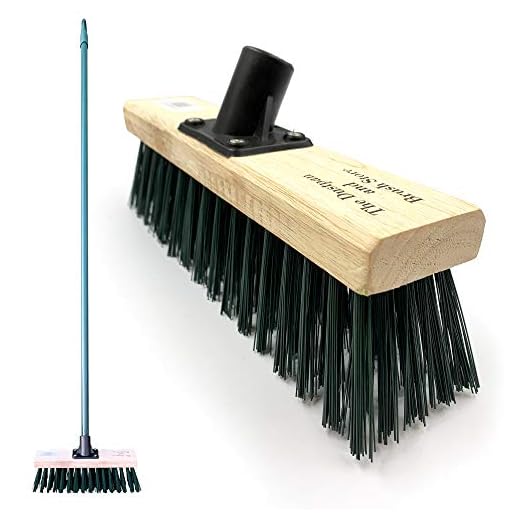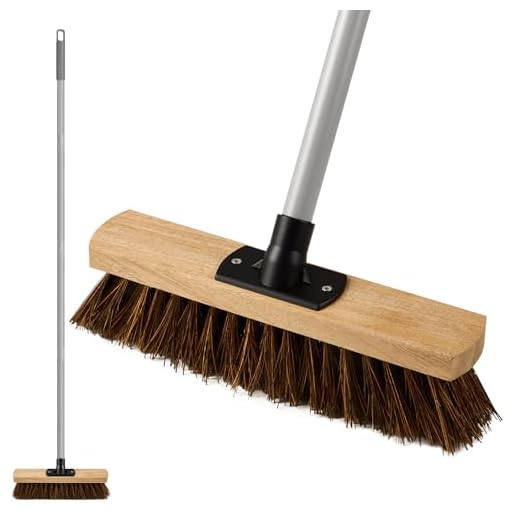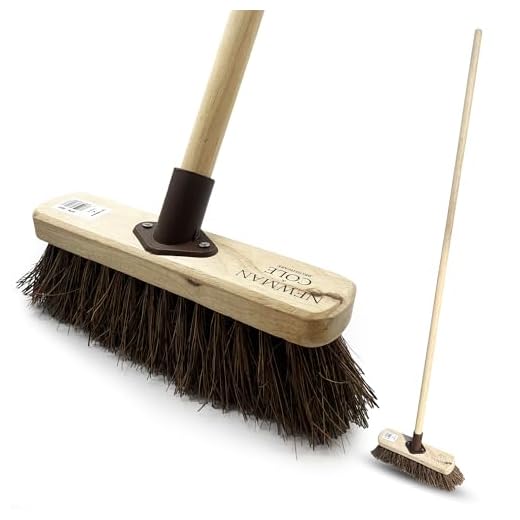A Comprehensive Guide to Outdoor Brushes for UK Homeowners
Outdoor brushes are essential tools for maintaining the cleanliness and appearance of your outdoor spaces, from patios and decks to driveways and garden paths. With a wide variety of outdoor brushes available, choosing the right one for your specific needs can greatly enhance your outdoor maintenance routine. This guide will cover the different types of outdoor brushes, their benefits, key considerations when purchasing, usage tips, and how to care for your brush to ensure it lasts.





Types of Outdoor Brushes
Outdoor brushes come in various types, each designed for specific tasks and surfaces. Understanding the different options can help you select the best brush for your cleaning needs.
- Stiff Bristle Brushes: These brushes are ideal for scrubbing tough dirt and grime off hard surfaces like concrete driveways, patios, and stone paths. The stiff bristles can effectively remove moss, algae, and embedded dirt, making them perfect for heavy-duty cleaning tasks.
- Soft Bristle Brushes: Soft bristle brushes are suitable for more delicate surfaces, such as wooden decking, outdoor furniture, or painted surfaces. They clean without scratching or damaging the surface, making them ideal for regular maintenance and light cleaning.
- Decking Brushes: Specifically designed for cleaning wooden decks, these brushes often have softer bristles to avoid damaging the wood while effectively removing dirt, debris, and mildew. Some decking brushes also feature angled heads to reach between deck boards.
- Wire Brushes: Wire brushes are equipped with metal bristles and are used for removing rust, paint, and other tough residues from metal surfaces. They are also useful for cleaning BBQ grills and other outdoor metal fixtures.
- Multi-Purpose Brushes: These brushes are versatile and can be used on various surfaces, including brick, stone, wood, and metal. They often feature a combination of stiff and soft bristles or a dual-sided design for tackling different cleaning tasks.
- Gutter Cleaning Brushes: Designed specifically for cleaning out gutters, these brushes usually have long handles and angled heads to reach into gutters and remove leaves, dirt, and debris.
Benefits of Using Outdoor Brushes
Using the right outdoor brush offers several benefits that can make your outdoor cleaning tasks easier and more effective.












- Effective Cleaning: Outdoor brushes are designed to handle tough outdoor conditions, making them more effective at removing dirt, grime, moss, and algae compared to indoor cleaning tools.
- Protects Surfaces: Choosing the right brush for your surface ensures that you can clean effectively without causing damage. Soft bristle brushes, for example, are gentle on wood and painted surfaces, preserving their appearance.
- Durability: Outdoor brushes are typically made with stronger materials to withstand exposure to the elements, ensuring they last longer even with regular use.
- Improved Safety: Regular cleaning of outdoor surfaces with the appropriate brush can prevent the build-up of slippery moss or algae, reducing the risk of accidents.
- Versatility: Many outdoor brushes are versatile, allowing you to use them for various tasks around your property, from scrubbing driveways to cleaning outdoor furniture.
Key Considerations When Buying an Outdoor Brush
When purchasing an outdoor brush, there are several factors to keep in mind to ensure you choose the right tool for your needs.
- Bristle Material: The material of the bristles is crucial in determining the brush’s effectiveness and suitability for different surfaces. For heavy-duty tasks, stiff synthetic bristles or metal wire bristles are ideal, while softer synthetic or natural bristles are better for delicate surfaces.
- Handle Length and Material: The length and material of the handle affect both comfort and durability. Long-handled brushes are useful for reaching high places or covering larger areas without bending over, while shorter handles offer better control for detailed scrubbing. Look for handles made of durable materials like metal or treated wood.
- Brush Head Size: The size of the brush head will determine how much area you can clean at once. Larger heads are more efficient for big areas like patios, while smaller heads provide precision for corners and tight spaces.
- Ergonomics: An ergonomic design can make a big difference in comfort, especially for long cleaning sessions. Look for features like padded grips, adjustable handles, or lightweight construction.
- Purpose and Surface Compatibility: Consider the specific tasks and surfaces you’ll be cleaning. Ensure the brush is suitable for the material you’ll be working on, whether it’s wood, stone, metal, or composite.
Pros and Cons of Outdoor Brushes
Like any tool, outdoor brushes come with their own set of advantages and disadvantages. Understanding these can help you make a more informed purchase decision.
- Pros: Outdoor brushes are specifically designed for tough outdoor cleaning tasks, offering superior effectiveness and durability compared to regular brushes. They come in various styles and bristle types to suit different surfaces, and many are affordable and easy to use.
- Cons: Some outdoor brushes, particularly those with stiff or wire bristles, can be too abrasive for certain surfaces, potentially causing damage if not used carefully. Additionally, larger brushes may be cumbersome for small or detailed cleaning tasks.
Usage Tips for Outdoor Brushes
To get the most out of your outdoor brush, consider these usage tips:
- Match the Brush to the Task: Use the right type of brush for the surface you’re cleaning. For example, a stiff bristle brush is ideal for scrubbing a concrete patio, while a softer brush is better suited for washing down outdoor furniture.
- Use Water and Cleaning Solutions: For tougher grime, use a combination of water and outdoor cleaning solutions. Apply the solution, let it sit for a few minutes to break down the dirt, and then scrub with the brush.
- Work in Sections: Break down large areas into smaller sections to ensure thorough cleaning. Focus on one area at a time to avoid missing spots or becoming overwhelmed.
- Protect Your Hands: Wear gloves when using outdoor brushes, especially those with stiff or wire bristles, to protect your hands from blisters or scratches.
- Rinse After Use: After cleaning, rinse the area with water to remove any remaining dirt or cleaning solution. This will also help prevent residue build-up on the surface.
Buying Guide: How to Choose the Right Outdoor Brush
When selecting an outdoor brush, it’s important to consider the specific needs of your outdoor spaces. Here’s a step-by-step guide to help you choose the right one:
- Assess Your Cleaning Needs: Consider the types of surfaces and the amount of dirt or debris you’ll be dealing with. For example, if you need to remove moss from a stone path, a stiff bristle or wire brush might be necessary.
- Choose the Appropriate Bristle Type: Select a brush with bristles that match the task. Softer bristles are better for delicate surfaces, while stiffer or wire bristles are suitable for tougher jobs.
- Consider Handle Length and Comfort: If you’ll be using the brush for extended periods, opt for a model with a comfortable, ergonomic handle. Adjustable or extendable handles can also be beneficial for reaching high or hard-to-reach areas.
- Look for Durability: Ensure the brush is made from high-quality materials that can withstand outdoor use. This includes durable bristles that won’t easily wear down and a sturdy handle that won’t break under pressure.
- Set a Budget: Outdoor brushes are available at various price points, so set a budget that fits your needs. Remember that investing in a high-quality brush can save you money in the long run by lasting longer and performing better.
Shopping for Outdoor Brushes Online
Shopping for outdoor brushes online can be convenient, offering a wide range of options to choose from. Here are some tips to help you find the best deals:
- Compare Products: Look at different models and brands to compare features, prices, and customer reviews. Websites like Amazon, B&Q, and Homebase offer a variety of outdoor brushes.
- Read Reviews: Customer reviews can provide insights into the brush’s performance, durability, and ease of use. Look for reviews that specifically mention the types of tasks and surfaces the brush was used on.
- Check Return Policies: Ensure the retailer offers a good return policy, especially if you’re trying out a new type of brush. This way, you can return or exchange the brush if it doesn’t meet your expectations.
- Look for Discounts: Online retailers often offer discounts, especially during sales events or with the use of promo codes. Websites like VoucherCodes or Honey can help you find the latest deals.
Caring for Your Outdoor Brush
Proper care and maintenance of your outdoor brush can extend its lifespan and ensure it remains effective. Here are some tips:
- Clean the Brush After Use: Rinse the bristles thoroughly with water after each use to remove any dirt or debris. This prevents build-up that can reduce the brush’s effectiveness over time.
- Store in a Dry Place: After cleaning, store the brush in a dry, sheltered area to protect it from the elements. Prolonged exposure to moisture can weaken the bristles and lead to mould growth.
- Inspect for Wear: Regularly check the bristles and handle for signs of wear or damage. Replace the brush if the bristles become too worn down to clean effectively.
- Hang the Brush: If possible, hang the brush by the handle to allow the bristles to dry evenly and maintain their shape. This also prevents the brush from sitting in water, which can damage the bristles.
Frequently Asked Questions
- Q: Can I use the same outdoor brush for different surfaces?A: While some brushes are versatile, it’s best to use a brush designed for the specific surface you’re cleaning. For example, a stiff bristle brush may be too harsh for painted surfaces but perfect for scrubbing concrete.
- Q: How often should I replace my outdoor brush?A: The lifespan of an outdoor brush depends on its quality and frequency of use. Inspect the brush regularly for signs of wear, such as flattened or frayed bristles. Replace it when it no longer cleans effectively.
- Q: Are wire brushes safe to use on all outdoor surfaces?A: Wire brushes are very abrasive and should only be used on tough surfaces like metal or stone. Avoid using them on softer materials like wood or plastic, as they can cause scratches or other damage.
- Q: Can I use outdoor brushes for indoor cleaning tasks?A: While it’s possible, outdoor brushes are typically too rough for indoor surfaces and may cause damage. It’s better to use brushes designed for indoor use, which have softer bristles suited to delicate surfaces.
- Q: What’s the best way to clean a brush after using it on mossy surfaces?A: Rinse the brush thoroughly with water to remove moss and debris. If the brush was used with a cleaning solution, rinse it until the water runs clear to avoid residue build-up. Allow the brush to dry completely before storing it.
Conclusion
Outdoor brushes are invaluable tools for keeping your outdoor spaces clean and well-maintained. Whether you’re dealing with stubborn grime on a patio, clearing away moss, or simply giving your garden furniture a fresh look, the right brush can make all the difference. By understanding the different types of outdoor brushes, considering your specific needs, and taking good care of your tools, you can ensure your outdoor areas remain clean, safe, and inviting all year round. With the tips and guidance provided in this article, you’ll be well-equipped to choose the perfect outdoor brush for your home.






